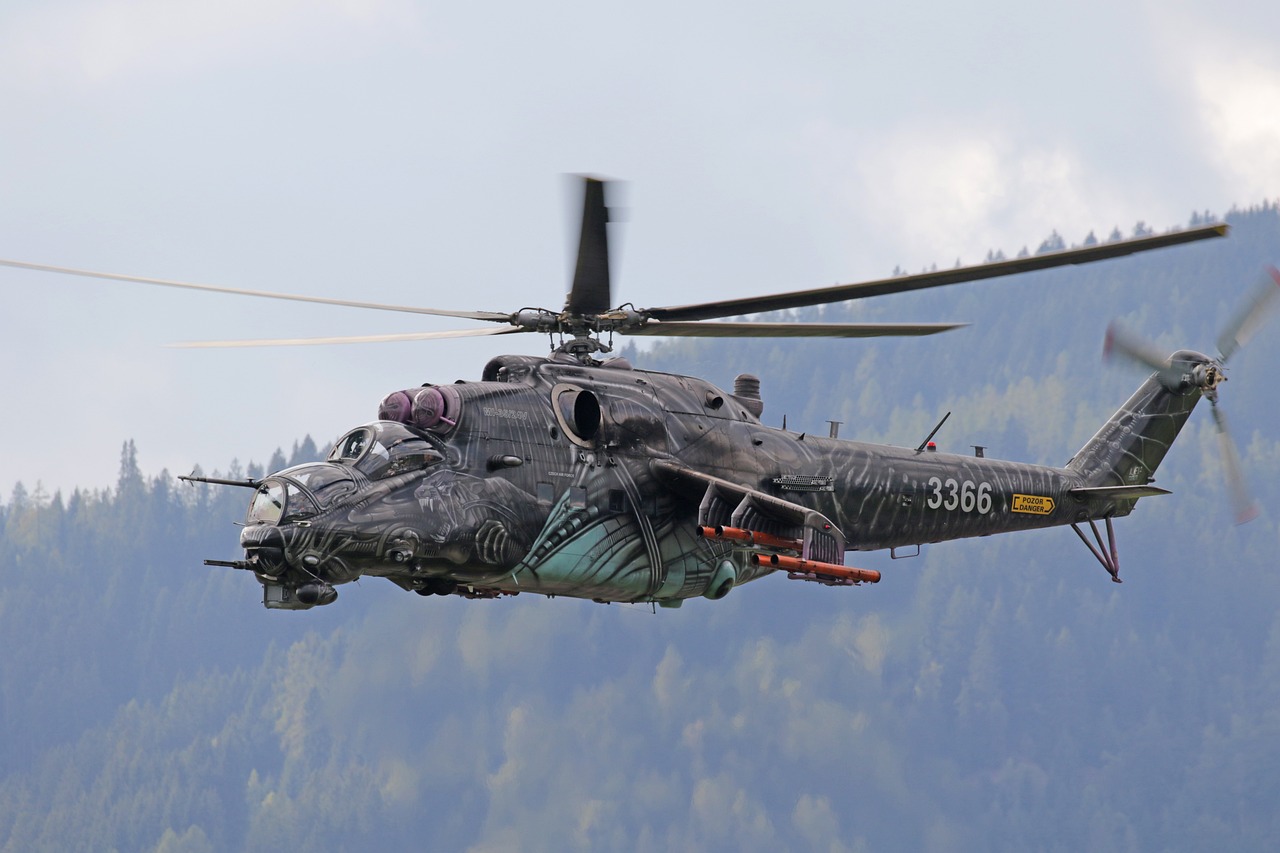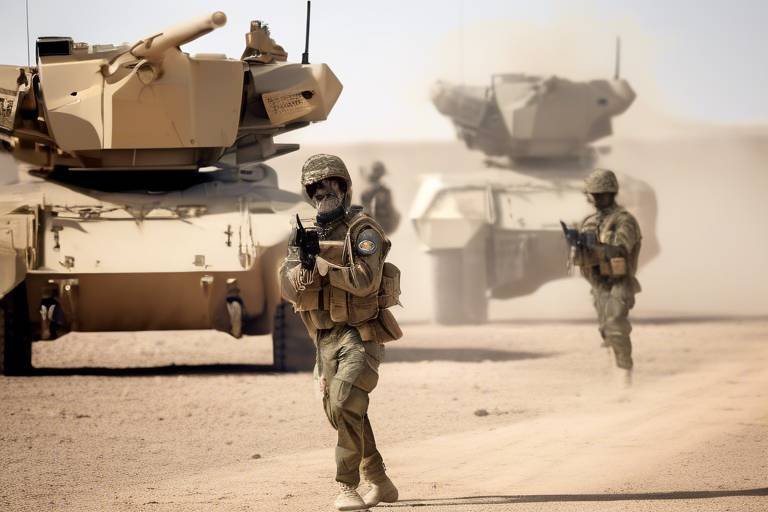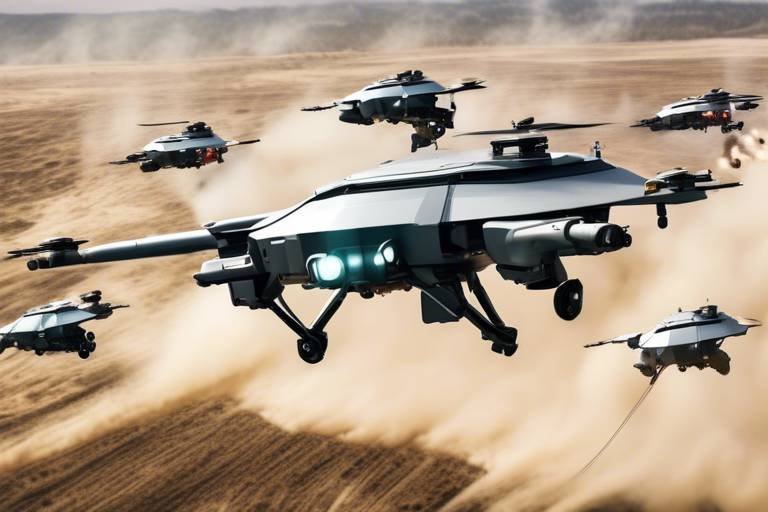The Integration of Artificial Intelligence in Military Strategy
In today's rapidly evolving world, the integration of artificial intelligence (AI) into military strategy is not just a trend; it’s a revolution. Imagine a battlefield where decisions are made in the blink of an eye, where machines can analyze vast amounts of data faster than any human could, and where military forces have an unprecedented edge over their adversaries. This is not science fiction; this is the reality of modern warfare, where AI technologies are reshaping how military operations are conducted. From enhancing combat effectiveness to improving logistical operations, AI is paving the way for a new era in defense strategies. But with great power comes great responsibility, and as we delve into the implications of AI in military contexts, we must also consider the ethical dilemmas and future challenges that lie ahead.
The military landscape is changing, and AI is at the forefront of this transformation. With capabilities such as machine learning, predictive analytics, and autonomous systems, military strategists are now equipped with tools that allow for rapid decision-making and enhanced operational capabilities. As we explore the various facets of AI integration, we will uncover how these technologies are not only enhancing operational efficiency but also redefining the very nature of warfare itself. The stakes are high, and understanding the implications of these advancements is crucial for military leaders, policymakers, and society as a whole.
As we embark on this journey through the integration of AI in military strategy, we will examine its role in modern warfare, the dynamics of AI-driven decision-making, and the vital human-machine collaboration that is essential for maximizing military effectiveness. Furthermore, we will address the ethical considerations that come with deploying AI in defense systems and discuss the future implications for international relations and global security. Buckle up, as we delve into a world where technology meets strategy, and the consequences of that convergence could shape the future of warfare.
- What is the primary role of AI in military strategy?
AI enhances decision-making, situational awareness, and operational efficiency on the battlefield. - Are there ethical concerns regarding the use of AI in warfare?
Yes, there are significant ethical considerations, especially regarding accountability and the use of autonomous weapons. - How does AI improve decision-making in military operations?
AI analyzes large data sets in real-time, allowing commanders to make informed decisions quickly. - What are autonomous weapons systems?
These are weapons that can operate without human intervention, raising ethical and accountability questions. - What does the future hold for AI in military strategy?
AI will increasingly shape defense policies and operational tactics as nations adapt to new security challenges.

[The Role of AI in Modern Warfare]
Artificial Intelligence (AI) is not just a buzzword; it's a game-changer in the realm of modern warfare. Imagine a battlefield where decisions are made in the blink of an eye, where information flows seamlessly, and where military forces can predict enemy movements with uncanny accuracy. This is the new reality brought about by AI technologies. It enhances not only the speed of operations but also the precision of strikes and the overall situational awareness of military personnel. With AI, military strategies are evolving from traditional methods to advanced, data-driven approaches that provide a significant edge over adversaries.
One of the most remarkable aspects of AI in warfare is its ability to analyze vast amounts of data at lightning speed. For instance, AI systems can process satellite imagery, drone footage, and intelligence reports simultaneously. This capability allows military commanders to have a comprehensive view of the battlefield, enabling them to make informed decisions that can mean the difference between success and failure in combat scenarios. The integration of AI streamlines operations, reduces human error, and enhances the effectiveness of military strategies.
Moreover, AI's role extends beyond just data analysis. It plays a crucial part in improving targeting systems. Traditional targeting methods often rely on human judgment, which can be flawed under pressure. AI algorithms, however, can assess multiple variables in real-time, adjusting targets based on changing conditions and ensuring that engagements are both precise and timely. This not only increases the chances of mission success but also minimizes collateral damage, a critical consideration in modern warfare.
As we delve deeper into the implications of AI on military strategy, it's essential to recognize that this technology is not without its challenges. The integration of AI systems requires extensive training and adaptation on the part of military personnel. There's a learning curve involved, and the human element remains vital in interpreting AI-generated insights. The collaboration between human intelligence and AI capabilities is what ultimately leads to a more effective military force.
In summary, the role of AI in modern warfare is transformative. It enhances decision-making processes, improves targeting accuracy, and provides military forces with unprecedented situational awareness. As nations continue to invest in AI technologies, the landscape of warfare will undoubtedly change, leading to a future where military strategies are more sophisticated and effective than ever before.

[AI-Driven Decision Making]
The integration of artificial intelligence (AI) in military strategy is not just a trend; it's a revolutionary shift that is reshaping how decisions are made on the battlefield. Imagine a scenario where military commanders can access real-time data analytics, allowing them to make informed decisions faster than ever before. This is the power of AI-driven decision-making. By utilizing advanced algorithms and machine learning techniques, military forces can analyze vast amounts of data, transforming it into actionable insights that enhance operational efficiency and effectiveness.
One of the most significant advantages of AI in decision-making is its ability to process information at lightning speed. Traditional methods of analysis often involve lengthy deliberations and potential delays. However, with AI, commanders can receive instant updates and recommendations based on the latest intelligence. This capability is akin to having a highly skilled advisor who never tires and can sift through mountains of data in seconds, providing insights that might take human analysts hours or even days to uncover.
Moreover, AI facilitates predictive modeling, allowing military leaders to foresee potential scenarios before they unfold. For instance, if a commander is planning an operation, AI can assess historical data to predict enemy movements and assess battlefield conditions. This foresight enables commanders to develop strategies that not only anticipate challenges but also optimize resource allocation, ensuring that troops are prepared for various outcomes. The importance of this cannot be overstated; it’s like having a crystal ball that provides a glimpse into the future of the battlefield.
To illustrate the impact of AI-driven decision-making, consider the following table that highlights key benefits:
| Benefit | Description |
|---|---|
| Speed | AI processes data in real-time, allowing for quicker decision-making. |
| Accuracy | Advanced algorithms reduce human error and enhance the reliability of intelligence. |
| Resource Optimization | AI helps allocate resources effectively based on predictive analytics. |
| Scenario Planning | AI can simulate various combat scenarios to prepare for different outcomes. |
Another fascinating aspect of AI-driven decision-making is its ability to conduct scenario simulations. Military strategists can utilize AI to create various combat scenarios, allowing them to evaluate potential outcomes and refine tactics before engaging in actual operations. This not only reduces risks but also significantly improves mission success rates. Think of it as a rehearsal before the big show; the more prepared you are, the better your performance will be.
However, it's essential to remember that while AI enhances decision-making, it does not replace the human element. The collaboration between human intelligence and AI systems is crucial for maximizing military effectiveness. Human intuition, experience, and ethical considerations must guide AI recommendations. This partnership creates a robust decision-making framework, blending the best of both worlds to navigate the complexities of modern warfare.
In conclusion, AI-driven decision-making is a game-changer in military strategy. It empowers commanders with the tools they need to make informed, timely decisions that can mean the difference between success and failure on the battlefield. As technology continues to evolve, the integration of AI will only deepen, shaping the future of military operations and strategies.
- What is AI-driven decision-making in the military? AI-driven decision-making refers to the use of artificial intelligence technologies to analyze data and provide actionable insights for military operations.
- How does AI improve operational efficiency? By processing vast amounts of data in real-time, AI allows military commanders to make quicker and more accurate decisions, optimizing resource allocation and enhancing situational awareness.
- What are the ethical concerns surrounding AI in military applications? Ethical concerns include accountability for decisions made by AI systems, the potential for autonomous weapons, and the need for regulatory frameworks to ensure responsible use.

[Predictive Analytics in Combat]
Imagine entering a battlefield where every move of the enemy is anticipated, where decisions are made not just on instinct but on a mountain of data processed in the blink of an eye. This is the power of predictive analytics in combat, a game-changer that is redefining how military operations are conducted. By employing advanced algorithms and machine learning, military strategists can analyze vast amounts of data to forecast enemy movements, assess battlefield conditions, and optimize resource allocation. This proactive approach is not just about reacting to threats but about anticipating them, creating a significant edge in combat scenarios.
At its core, predictive analytics involves the use of historical data combined with real-time information to predict future events. For instance, if we consider a scenario where troop movements are tracked, AI systems can analyze patterns from previous engagements to predict where an enemy might strike next. This capability allows commanders to allocate resources more effectively, positioning troops and equipment where they are most likely to be needed. The result? A more agile and responsive military force that can adapt to rapidly changing situations.
Moreover, the integration of predictive analytics extends beyond simple troop movements. It encompasses various factors such as weather conditions, terrain analysis, and even psychological profiles of adversaries. By synthesizing this information, military leaders can develop comprehensive strategies that take into account the multifaceted nature of modern warfare. For example, consider a table that outlines key factors analyzed by AI systems:
| Factor | Description | Impact on Strategy |
|---|---|---|
| Troop Movements | Analysis of historical and real-time movements | Enables preemptive positioning of forces |
| Weather Conditions | Impact of weather on visibility and mobility | Informs timing and location of operations |
| Terrain Analysis | Assessment of geographical advantages | Guides tactical decisions and movement |
| Psychological Profiles | Understanding enemy morale and decision-making | Helps in predicting reactions and counteractions |
By leveraging such diverse data, military planners can create simulations of potential combat scenarios. These simulations allow them to evaluate various outcomes and refine tactics without the risks associated with actual combat. It’s akin to playing a complex game of chess, where understanding the opponent's strategy can lead to a decisive victory. The ability to run these simulations in real-time means that adjustments can be made on the fly, ensuring that military operations remain fluid and responsive to the battlefield's dynamics.
However, while predictive analytics offers tremendous advantages, it is not without its challenges. The accuracy of predictions is heavily reliant on the quality and breadth of the data fed into the systems. Inaccurate or incomplete data can lead to erroneous conclusions, potentially putting troops at risk. Therefore, continuous monitoring and validation of the data sources are paramount to maintaining the integrity of predictive analytics in military operations.
In conclusion, the integration of predictive analytics into military strategy is transforming how combat is approached. By anticipating enemy actions and optimizing resource allocation, military forces can operate with a level of precision and foresight that was previously unimaginable. As technology advances, the potential for even more sophisticated predictive models will only enhance the effectiveness of military operations, paving the way for a future where data-driven decisions are the norm on the battlefield.
- What is predictive analytics in military combat? Predictive analytics involves using historical and real-time data to forecast enemy movements and optimize military strategies.
- How does AI improve decision-making in combat? AI processes vast amounts of data quickly, providing commanders with insights that enhance situational awareness and operational efficiency.
- What are the risks associated with predictive analytics? The primary risk is the reliance on data quality; inaccurate data can lead to poor decision-making and potentially endanger troops.
- Can predictive analytics be used in non-combat scenarios? Yes, predictive analytics has applications in logistics, resource management, and training within the military context.

[Real-Time Data Processing]
In the fast-paced world of modern warfare, real-time data processing stands as a cornerstone of effective military strategy. Imagine being in a high-stakes game of chess, where every move counts, and the board is constantly changing. This is the reality for military personnel who must adapt to rapidly evolving battlefield conditions. With the help of artificial intelligence, the military can now process vast amounts of data almost instantaneously, enabling commanders to make informed decisions on the fly.
AI systems are equipped to analyze a multitude of data sources—everything from satellite imagery and drone feeds to ground troop reports and sensor data. This capability not only enhances situational awareness but also provides a comprehensive picture of the battlefield. For instance, if a sudden shift in enemy troop movements is detected, AI can quickly assess the situation and recommend tactical adjustments. This level of responsiveness is crucial, as it can mean the difference between victory and defeat.
Moreover, the integration of real-time data processing allows for a more efficient allocation of resources. Think of it like a conductor leading an orchestra; every musician must know when to play their part to create a harmonious outcome. Similarly, military leaders can coordinate their forces more effectively, ensuring that assets are deployed where they are needed most. This can lead to improved combat effectiveness and reduced casualties, as units can avoid unnecessary engagements.
To illustrate the impact of real-time data processing, consider the following table that outlines its key benefits:
| Benefit | Description |
|---|---|
| Enhanced Situational Awareness | Provides a complete view of the battlefield, enabling quick decision-making. |
| Resource Allocation | Optimizes the deployment of troops and equipment based on real-time needs. |
| Rapid Response | Enables swift action in response to changing conditions, reducing reaction times. |
| Predictive Insights | Forecasts potential enemy actions, allowing for proactive strategies. |
In conclusion, the ability to process data in real-time not only enhances military operations but also transforms the way strategies are developed and executed. As AI continues to evolve, we can expect even greater advancements in how data is utilized on the battlefield, pushing the boundaries of what is possible in military strategy.
- What is real-time data processing in military operations?
Real-time data processing involves the immediate analysis and interpretation of data as it is collected, allowing military commanders to make quick and informed decisions based on the latest information available.
- How does AI enhance situational awareness?
AI enhances situational awareness by aggregating and analyzing data from various sources, providing a comprehensive view of the battlefield that helps military leaders respond to threats more effectively.
- What are the potential risks of real-time data processing?
While real-time data processing offers numerous benefits, it also poses risks such as information overload and the potential for misinterpreting data, which could lead to poor decision-making.

[Scenario Simulation]
Imagine preparing for battle without ever stepping foot on the battlefield. Scenario simulation powered by artificial intelligence (AI) allows military strategists to do just that. By creating a virtual environment where various combat situations can be modeled, military leaders can explore countless possibilities and outcomes without the inherent risks of real-world engagements. This technology serves as a digital playground for strategists, enabling them to test their plans against a myriad of potential enemy responses and environmental factors.
Through advanced algorithms and machine learning, AI can generate realistic scenarios that incorporate variables such as troop movements, terrain changes, and even weather conditions. This means that military planners can experiment with different strategies and tactics, assessing their effectiveness before committing resources in actual combat. For instance, a simulation might reveal that a particular approach is vulnerable to a specific counter-strategy, allowing commanders to adjust their plans accordingly.
The benefits of scenario simulation extend beyond mere tactical adjustments. They also allow for comprehensive training of personnel, as soldiers can engage in these simulations to hone their skills in a risk-free setting. By facing off against AI-driven opponents, troops can learn to think on their feet and adapt to rapidly changing situations. This immersive experience can be far more effective than traditional training methods, which often lack the unpredictability of real combat.
Furthermore, scenario simulations can be tailored to individual units or missions, providing a customized training experience that addresses specific challenges faced by different branches of the military. For example, a naval fleet might simulate a maritime conflict, while an army unit could focus on urban warfare tactics. This level of specificity ensures that every soldier is well-prepared for the unique challenges they may encounter.
However, while the advantages of scenario simulations are clear, they also raise important questions. As military organizations increasingly rely on AI for training and planning, the potential for over-reliance on these simulations could lead to a disconnect from the realities of combat. It's crucial that while embracing these advanced technologies, military leaders maintain a balance between AI-driven insights and the invaluable lessons learned from actual battlefield experiences.
In conclusion, scenario simulation stands as a testament to the transformative power of AI in military strategy. By enabling comprehensive testing of tactics and training in a controlled environment, it not only enhances preparedness but also fosters innovation in military operations. As technology continues to evolve, so too will the capabilities of scenario simulations, promising an even more sophisticated approach to modern warfare.
- What is scenario simulation in military strategy? Scenario simulation involves using AI to create virtual combat environments where military strategies can be tested and refined without real-world risks.
- How does AI enhance scenario simulations? AI enhances scenario simulations by modeling complex variables and generating realistic scenarios that help military planners anticipate challenges and improve tactics.
- What are the benefits of using scenario simulations for training? Scenario simulations provide a risk-free environment for soldiers to practice their skills, adapt to unpredictable situations, and prepare for specific mission challenges.
- Are there any risks associated with over-reliance on AI simulations? Yes, over-reliance on AI simulations can create a disconnect from real combat experiences, emphasizing the need for a balanced approach that includes lessons learned from actual operations.

[Human-Machine Collaboration]
The collaboration between human intelligence and artificial intelligence (AI) systems is not just a futuristic concept; it is a vital component of modern military strategy. Imagine a scenario where a seasoned military commander, with years of experience and intuition, teams up with a state-of-the-art AI system capable of processing vast amounts of data in seconds. This partnership can significantly enhance decision-making, making it more efficient and effective on the battlefield. Human-machine collaboration allows for a seamless integration of human judgment and machine precision, creating a dynamic duo that can tackle complex challenges in real time.
One of the most compelling aspects of this collaboration is the ability to leverage the strengths of both entities. Humans bring creativity, emotional intelligence, and the capacity for ethical reasoning to the table, while AI contributes unparalleled speed, accuracy, and data analysis capabilities. This combination can lead to more comprehensive strategies that take into account not only the numerical data but also the human factors that influence outcomes. For instance, while an AI system can analyze enemy movements and predict potential threats, a human commander can assess the morale of their troops or the cultural implications of certain military actions.
Furthermore, the integration of AI into military operations can enhance training programs. By using AI-driven simulations, military personnel can engage in realistic exercises that mimic potential combat scenarios. This not only prepares them for the unexpected but also allows them to practice decision-making in high-pressure environments. Imagine training for a mission where AI analyzes real-time data and provides feedback on every decision made, helping soldiers refine their tactics and strategies before they even set foot on the battlefield.
However, this collaboration does not come without its challenges. There is an ongoing debate about the extent to which AI should be trusted in critical decision-making processes. While AI can provide valuable insights, the ultimate responsibility for decisions, especially those involving life and death, should remain with human operators. The question arises: how do we balance the efficiency of AI with the moral and ethical considerations that come with military actions? This is where continuous dialogue and training come into play, ensuring that military personnel are equipped to make informed decisions while understanding the limitations of AI.
In conclusion, the future of military operations hinges on the effective collaboration between human intelligence and AI systems. As technology continues to advance, this partnership will evolve, leading to new strategies and tactics that redefine warfare. The goal is not to replace human decision-making but to enhance it, creating a more robust and agile military force capable of adapting to the complexities of modern combat.
- What is human-machine collaboration in the military?
Human-machine collaboration refers to the partnership between human intelligence and AI systems to enhance decision-making and operational effectiveness in military contexts. - How does AI improve military training?
AI enhances military training by providing realistic simulations that allow personnel to practice decision-making and tactics in high-pressure scenarios. - What are the ethical concerns of AI in military operations?
Ethical concerns include accountability for decisions made by AI, the potential for autonomous weapons, and ensuring compliance with international humanitarian laws. - Can AI fully replace human decision-making in the military?
No, while AI can provide valuable insights and data analysis, human judgment and ethical considerations are crucial in military decision-making.

[Ethical Considerations in AI Deployment]
The integration of artificial intelligence (AI) in military operations is not just a technological advancement; it also raises profound ethical questions that demand our attention. As we stand on the brink of a new era in warfare, we must critically examine the implications of deploying AI in combat scenarios. One of the most pressing issues is the accountability for decisions made by AI systems. If an autonomous drone makes a mistake and causes civilian casualties, who is held responsible? The programmer? The military commander? Or is it the machine itself? These questions highlight the need for a clear understanding of the accountability landscape in AI operations.
Furthermore, the potential for autonomous weapons systems introduces a new layer of complexity to military ethics. These systems can operate without human intervention, making decisions based on algorithms and data analysis. This raises significant concerns about the moral implications of allowing machines to make life-and-death decisions. The absence of human judgment in critical situations could lead to unforeseen consequences, making it essential to establish strict guidelines governing the use of such technologies.
To address these ethical dilemmas, it is crucial to develop comprehensive regulatory frameworks that govern AI deployment in military contexts. Such frameworks should encompass various aspects, including:
- Human Oversight: Ensuring that human operators remain in control of AI systems and can intervene when necessary.
- Transparency: Developing AI algorithms that are understandable and explainable, so decision-making processes can be scrutinized.
- Compliance with International Laws: Ensuring that AI applications adhere to international humanitarian laws and ethical standards.
Additionally, discussions surrounding the ethical use of AI in military operations must involve a diverse range of stakeholders, including ethicists, technologists, military leaders, and policymakers. This collaborative approach is essential for creating a balanced perspective on the advantages and risks associated with AI technologies.
As we move forward, the conversation about the ethical implications of AI in military contexts will only grow in importance. The military must navigate this complex landscape carefully, balancing the benefits of enhanced operational capabilities with the moral responsibilities that come with such power. By addressing these ethical considerations proactively, we can help ensure that the deployment of AI in military strategy is not only effective but also responsible and aligned with our shared values.
Q1: What are the main ethical concerns regarding AI in military applications?
A1: The primary concerns include accountability for decisions made by AI, the implications of autonomous weapons systems, and the need for regulatory frameworks to ensure responsible use.
Q2: How can we ensure accountability when using AI in military operations?
A2: Establishing clear guidelines that define roles and responsibilities, as well as ensuring human oversight of AI systems, can help maintain accountability.
Q3: What role do regulatory frameworks play in AI deployment in the military?
A3: Regulatory frameworks help set standards for the ethical use of AI, ensuring compliance with international laws and promoting responsible practices in military operations.

[Autonomous Weapons Systems]
As technology continues to advance at a breakneck pace, the emergence of autonomous weapons systems (AWS) has become a hot topic in military discussions. These systems, which can operate without direct human intervention, promise to revolutionize the battlefield in ways we can only begin to imagine. However, with great power comes great responsibility, and the ethical implications of deploying such technology are profound. Imagine a world where machines make life-and-death decisions—it's a scenario that raises eyebrows and questions alike.
At the heart of the debate surrounding AWS is the question of accountability. If a drone equipped with autonomous capabilities conducts an airstrike that results in civilian casualties, who is held responsible? Is it the programmer who coded the algorithms, the military personnel who deployed the weapon, or perhaps the government that authorized its use? These questions are not merely academic; they have real-world implications that demand serious consideration.
Moreover, the potential for unintended consequences is significant. Autonomous systems rely on complex algorithms and vast amounts of data to make decisions. However, they may not always interpret that data in the same way a human would. For instance, a machine might misidentify a target due to a glitch or a lack of contextual understanding, leading to catastrophic outcomes. This unpredictability is a major concern for military strategists and ethicists alike.
To better understand the implications of AWS, consider the following table that outlines some of the key advantages and disadvantages:
| Advantages | Disadvantages |
|---|---|
| Increased efficiency in combat operations | Loss of human oversight in critical decisions |
| Ability to operate in high-risk environments | Potential for malfunction or error |
| Reduced risk to human soldiers | Ethical dilemmas regarding accountability |
| Faster response times in dynamic combat situations | Challenges in international law compliance |
As nations race to develop and deploy these advanced systems, it is crucial to establish a regulatory framework that governs their use. Such frameworks should address not only the technical specifications of AWS but also the ethical considerations surrounding their deployment. This includes guidelines on how decisions are made, who is accountable for those decisions, and how to ensure compliance with international humanitarian law.
In conclusion, while autonomous weapons systems have the potential to enhance military capabilities, they also pose significant ethical and operational challenges. As we stand on the brink of this technological revolution, it is imperative that we engage in thoughtful discussions about the implications of these systems and work towards developing responsible policies that prioritize human life and ethical considerations over mere technological advancement.
- What are autonomous weapons systems? Autonomous weapons systems are military technologies that can operate without human intervention, utilizing artificial intelligence to make decisions on the battlefield.
- What are the ethical concerns surrounding AWS? Ethical concerns include accountability for decisions made by machines, the potential for unintended consequences, and the implications for international law.
- How can nations regulate the use of AWS? Nations can establish regulatory frameworks that dictate the responsible use of AWS, ensuring compliance with ethical standards and humanitarian laws.

[Regulatory Frameworks]
The integration of artificial intelligence (AI) into military operations is not just a technological advancement; it also necessitates a comprehensive approach to regulation. As we move forward into an era where AI systems are becoming increasingly autonomous, it is crucial to establish regulatory frameworks that ensure these technologies are used responsibly and ethically. The complexity of warfare, combined with the rapid pace of AI development, creates a unique set of challenges that policymakers must address.
One of the primary concerns surrounding AI in military applications is the potential for misuse or unintended consequences. For instance, autonomous weapons systems could make life-and-death decisions without human oversight, raising questions about accountability. Who is responsible if an AI system makes a mistake that leads to civilian casualties? As such, regulatory frameworks must clearly define the roles and responsibilities of human operators and AI systems alike.
Moreover, these frameworks should include guidelines on the ethical use of AI technologies. This involves not only ensuring compliance with international humanitarian laws but also fostering transparency in how AI systems are developed and deployed. The military must engage in open dialogues with various stakeholders, including ethicists, technologists, and the public, to create a consensus on what constitutes responsible AI use in warfare.
To illustrate the importance of regulatory frameworks, consider the following key elements that should be included:
- Accountability: Clearly define who is responsible for decisions made by AI systems.
- Transparency: Ensure that the decision-making processes of AI systems are understandable and accessible.
- Compliance: Align AI deployment with international laws and ethical standards.
- Oversight: Implement mechanisms for monitoring and evaluating AI systems in military contexts.
Additionally, international cooperation is vital. Countries must collaborate to create a cohesive set of regulations that govern the use of AI in military operations. This could involve treaties or agreements that establish norms and standards for AI technologies, much like existing frameworks for arms control. Such collaboration would not only promote responsible usage but also foster trust among nations, reducing the risk of an AI arms race.
In conclusion, as AI continues to reshape military strategies, the establishment of robust regulatory frameworks will be essential. These frameworks must balance innovation with ethical considerations, ensuring that AI technologies enhance military effectiveness without compromising moral responsibilities. By proactively addressing these challenges, we can pave the way for a future where AI serves as a powerful ally in defense, while still upholding the principles of humanity and accountability.
- What is the role of AI in military strategy?
AI enhances decision-making, improves targeting, and increases situational awareness, giving military forces a strategic edge. - What are the ethical concerns related to AI in warfare?
Concerns include accountability for autonomous weapons and ensuring compliance with humanitarian laws. - How can countries collaborate on AI regulations?
Through treaties and agreements that set standards for responsible AI usage in military contexts. - What are the key elements of regulatory frameworks for AI?
Accountability, transparency, compliance, and oversight are crucial components.

[Future Implications of AI in Defense]
The future of military strategy is undeniably intertwined with the advancements in artificial intelligence (AI). As nations strive to maintain a competitive edge, the integration of AI technologies into defense systems will not only reshape operational tactics but also redefine international relations. Imagine a battlefield where decisions are made in the blink of an eye, where data is analyzed and acted upon faster than any human could fathom. This is the reality that AI is paving the way for, and it brings with it a plethora of implications that we must consider.
One of the most significant implications of AI in defense is the transformation of military operations. With AI systems capable of analyzing vast amounts of data from various sources, military strategists can leverage predictive analytics to anticipate enemy movements and assess battlefield conditions. This capability allows for a more agile response to threats, ultimately enhancing operational effectiveness. For instance, AI can provide real-time insights into troop movements, enabling commanders to make informed decisions that could mean the difference between victory and defeat.
Furthermore, the reliance on AI will lead to a shift in defense policies. Nations will need to adapt their military doctrines to incorporate AI-driven strategies, which may involve rethinking traditional approaches to warfare. As AI technologies evolve, so too will the nature of conflicts. The emphasis will likely shift from sheer manpower to technological superiority, making it imperative for countries to invest in AI research and development.
However, this rapid evolution also raises important questions regarding international relations. As countries race to develop advanced AI capabilities, there is a risk of escalating tensions and an arms race in AI technologies. Nations may find themselves in a precarious position, where the balance of power is determined by the sophistication of their AI systems. This dynamic could lead to new alliances and rivalries, fundamentally altering the landscape of global security.
Moreover, the ethical implications of deploying AI in defense cannot be overlooked. As military operations become increasingly automated, the question of accountability arises. Who is responsible when an AI system makes a decision that leads to unintended consequences? These are complex issues that require careful consideration and dialogue among nations to establish regulatory frameworks that govern the use of AI in military contexts.
In conclusion, the future implications of AI in defense are vast and multifaceted. As we stand on the brink of a new era in military strategy, it is crucial for policymakers, military leaders, and technologists to engage in ongoing discussions about the potential benefits and challenges that AI presents. By addressing these issues proactively, we can harness the power of AI to enhance national security while ensuring that ethical considerations are at the forefront of our defense strategies.
- What role will AI play in future military operations?
AI will enhance decision-making, improve targeting, and increase situational awareness, providing a strategic advantage on the battlefield. - How will AI affect international relations?
The development of AI technologies may lead to an arms race, altering alliances and rivalries based on technological superiority. - What are the ethical concerns regarding AI in defense?
Ethical concerns include accountability for AI actions, the potential for autonomous weapons, and the need for regulatory frameworks. - Can AI predict enemy movements?
Yes, AI systems can analyze data to forecast enemy actions and optimize military strategies accordingly.
Frequently Asked Questions
- How is AI changing military strategies?
AI is revolutionizing military strategies by enhancing decision-making, improving targeting accuracy, and increasing situational awareness. This technological advancement allows military forces to respond more rapidly and effectively on the battlefield, ultimately providing a significant strategic advantage.
- What role does predictive analytics play in combat?
Predictive analytics powered by AI enables military planners to forecast enemy movements and assess battlefield conditions. By analyzing vast amounts of data, AI helps in developing strategies that anticipate challenges, allowing for better resource allocation and mission success.
- Can AI improve real-time data processing in military operations?
Absolutely! AI systems are designed to process large volumes of data in real-time, enhancing situational awareness for military personnel. This capability ensures that commanders can make swift decisions based on the most current information available, adapting to any changes on the battlefield.
- What is the significance of human-machine collaboration in military settings?
The collaboration between human intelligence and AI is crucial for maximizing military effectiveness. By combining human intuition with machine precision, military strategists can create a more robust decision-making framework that enhances overall operational success.
- What ethical concerns arise from the use of AI in military applications?
The deployment of AI in military contexts raises several ethical concerns, particularly regarding accountability and decision-making authority. The potential for autonomous weapons systems to operate without human intervention prompts important discussions about the moral responsibilities of military actions and the need for regulations.
- Are there regulations governing the use of AI in military operations?
Establishing regulatory frameworks is essential to ensure the responsible use of AI in military contexts. These frameworks address concerns related to security, ethics, and compliance with international humanitarian laws, aiming to guide the development and deployment of AI technologies in defense.
- What does the future hold for AI in military strategy?
The future of military strategy will increasingly rely on AI technologies, influencing defense policies, operational tactics, and international relations. As nations adapt to the evolving landscape of warfare, AI will play a pivotal role in shaping how military forces operate and respond to security challenges.



















